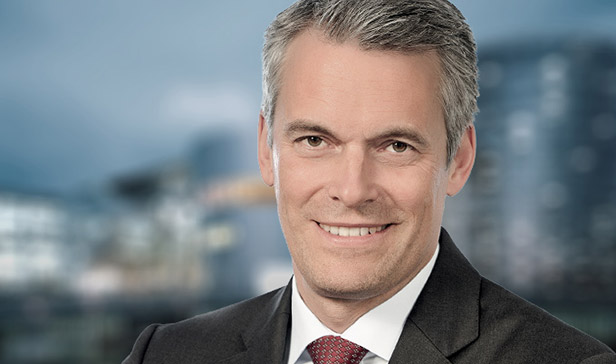In the Expo Real issue of trade press magazine "Der Facility Manager" management board member Dr. Gert Riegel talks about the development cooperation of Apleona and IBM and what our clients expect from digital solutions. He also explains, why digital solutions especially make sense for the real estate portfolios of Apleona`s large international clients.
Read the interview here:
Real estate service provider as partner for digitization
Everybody’s talking about digitalization. What specific requirements do large FM companies have when it comes to digitalization?
First of all, they require solutions geared toward improving the use of buildings and facilities, usually for their own employees and visitors to the property. The objective is a better user experience, for example through the optimized booking and allocation of rooms or parking spaces using sensors, or more convenient complaints management with an incident app. Large customers in particular set great store by individual solutions that have been developed specially for their requirements and branded in their own look and feel.
Secondly, in the medium term this customer group expects us to use existing technological means to develop data-driven products and services from the mass of data that can already be generated in real time from properties and about the users and their behavior. Top priorities here are data-driven decision aids for portfolio management or maintenance and greater transparency in service provision.
Are there international differences here? How is the situation in Germany compared with other countries?
With the ICC organization, we support major customers with international portfolios. They are currently the ones with an interest in unifying standards, e.g. SLAs, in order to allow them to harmonize the quality of service provision across all national borders and to manage it in a standardized manner. Digitalization will be an instrumental factor here in the future. This aspiration never changes, regardless of whether our customer is based in Germany, the USA or London.
Some technologies may be introduced earlier in some places, for example because labor costs are significantly higher. This is a phenomenon that can already be observed today, for example in parking management or public transport. While machines have long since replaced personal service outside of city centers in Central Europe, the ticket counter is often still staffed even in small towns in industrial nations such as the USA.
How do large customers’ requirements regarding digitalization differ from those of small and medium-sized enterprises?
At the moment, we can clearly see that digital solutions are being requested more frequently by larger customers than by small ones. But exceptions prove the rule, and it does not have to stay this way. Our strategy, therefore, is to develop operational applications together with major customers, to test them live in portfolios managed by us, and then to roll them out to all interested customers as standard applications.
We are not developing stand-alone solutions, but rather solutions that are both customizable and scalable, whether for large or small portfolios or customers.
Which sectors are showing the most interest when it comes to digitalization in FM?
Our solutions for a more convenient and better use of buildings are being met with great interest, and even enthusiasm, across all sectors. This is hardly surprising, as we all now know and appreciate the comforts and advantages of digital and mobile customer solutions through e-commerce or travel. Many companies have also long since realized that user convenience at the workplace is a significant factor in employee satisfaction and loyalty. We are already recognizing this as an FM provider in increased expectations for the quality of cafeterias, for example. We are supplementing our service in the company restaurants we manage with a user app that provides not only the menus for the week in question but also the recipes and the nutritional information for the dishes being served.
Which services can FM providers take on, what must companies tackle themselves?
Allow me to answer as follows: Real estate service providers will soon require a digital IT platform that is compatible with all potential customer and business partner solutions. Apleona is currently working hard on such a platform, the Apleona Eco-System. We want to be able, as required, to work on or with customers’ systems or to integrate third-party solutions, because we will certainly not be able or willing to develop everything ourselves.
We have been talking about computer-aided facility management for around 25 years. Today, everyone is acting like digitalization is the next big thing and completely uncharted territory. Have the last 25 years been all talk, with nothing being done or too little achieved?
The ability to collect data, transfer it in real time, analyze it with artificial intelligence and process it quickly and virtually error-free by way of automation, for example, will turn the real estate services sector completely upside down. The question is one of timing. I would quote my colleague Mr. Weixler here, who during the presentation of the Lünendonk study said that the impact of digitalization within a two-year time frame is thoroughly overestimated, while being thoroughly underestimated in a ten-year time frame.
You have concluded a development partnership with IBM for digital and cloud-based applications and are working on predictive maintenance, office space utilization (with the option of forecasts on anticipated utilization levels), and automated solutions for reception and concierge services: Can you give details on the specific solutions?
Together with our customers, we are currently working on more than 20 different solutions simultaneously, which are in various stages of development. They range from outlines of the problem and initial draft solutions to test phases of MVPs (minimal viable products) and the deployment of advance-stage products under real conditions. At the headquarters of IBM itself, for example, our booking solution for the conference system there is already in successful operation and is being continuously improved with the aim of rolling out this solution throughout the entire portfolio.
How exactly does cooperation and the allocation of responsibilities in the IBM Cloud Garage work?
Similar to a start-up company, all stakeholders – product managers, architects, designers, developers and users – come together to cooperate on a solution. The Apleona core team of five service specialists, complemented by further experts depending on the case, provides the FM expertise, always linked back to the respective customer requirements. The team in the IBM Cloud Garage works and functions quickly, with flat hierarchies and short decision-making paths. The iterative process covers the development from the initial idea to the first minimal application and right up to a product that is scalable and deployable in many areas, and that in extremely short development times.
What does IBM get from the development partnership?
You should probably ask IBM that. We have been a service partner to IBM for more than 15 years and are now continuing this partnership with the roles reversed for the development of digital solutions. We were proud to be co-exhibitor at IBM’s stand at Cebit and conversely are delighted that IBM will join us to present jointly developed solutions at Expo Real.
Both providers and customers of FM services are currently complaining of a severe shortage of skilled workers. Mastering the challenges of digitalization demands special know-how. Up until now, FM service providers have not been the first choice for highly qualified IT experts when looking for jobs. What arguments can you use to persuade relevant specialists to sign on with you?
The partnership with IBM is helpful here, too.



